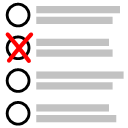Topics at 22C3: Voting early, voting often
 “_Vote early, vote often_” is a quote variously attributed to three different Chicagoans: [Al Capone][1], the famous gangster; [Richard J. Daley][2], mayor from 1955 to 1976; and [William Hale Thompson][3], mayor from 1915-1923 and 1931-1935. All three were notorious for their corruption and their manipulation of the democratic process. It is most likely that Thompson invented the phrase, and Capone and Daley later repeated it.
“_Vote early, vote often_” is a quote variously attributed to three different Chicagoans: [Al Capone][1], the famous gangster; [Richard J. Daley][2], mayor from 1955 to 1976; and [William Hale Thompson][3], mayor from 1915-1923 and 1931-1935. All three were notorious for their corruption and their manipulation of the democratic process. It is most likely that Thompson invented the phrase, and Capone and Daley later repeated it.
Voting early (and not too often) is a major topic at the 22C3. Debugging technical and political problems of modern democracies is yet another field of interest for hackers who want to keep the big picture in view.
First in our little series of voting-related talks is “e-Voting: The silent decline of public control — Why German voting machines do not meet the requirements of democratic elections.” on day 3 by Ulrich Wiesner. He is currently involved in a legal battle that questions the validity of Germany’s most recent national election — the one that brought Angela Merkel to power just a few months ago. Being a scientist, his arguments are purely scientific: He argues about physical deficiencies of these voting machines that were deployed in some of Germany’s most populous areas such as the Ruhr area and Cologne.
Looking away from Germany and going further to the east of Europe, we find the small Baltic country of Estonia (or e-Stonia, as it has been nicknamed due to its enthusiasm for the Internet). With its population of roughly 1.4 million it became the first nation ever to hold nationwide elections over the Internet this October when 9,200 votes were cast online. On hearing this, we immediately knew that we needed a talk on the technical backgrounds of Internet voting for the 22C3. After some communication that involved the very friendly and helpful Estonian embassy in Berlin and an even friendlier employee of the Estonian parliament Riigikogu, we eventually managed to get the guy as a speaker who is (technically) behind this herculean task. Tarvi Martens is the Estonian authority on computer security and networking and we are proud to have him talk on “Internet Voting in Estonia” on day 3.
Last, not least, we have a lecture on “Fuzzy Democracy” on day 2. Svenja Schröder and Christiane Ruetten will talk about ways to implement alternative decision-making processes in order to overcome the manipulative “vote early, vote often” with a more constructive “get involved, vote better informed”.

